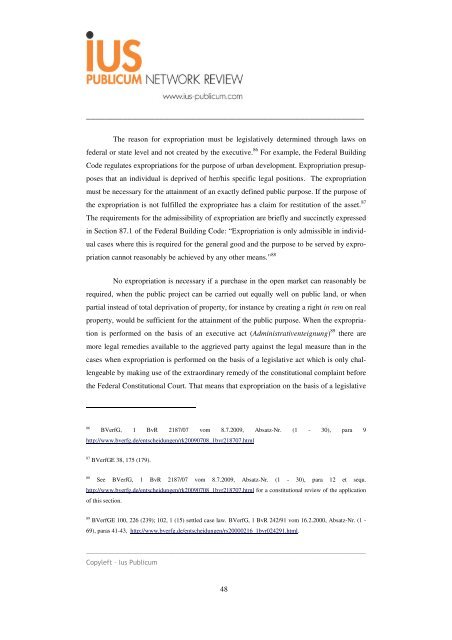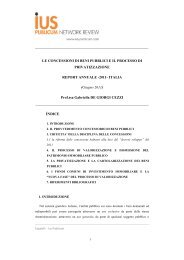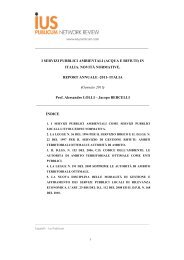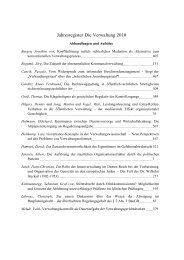Athanasios Gromitsaris, Expropriations, Takings - ius-publicum
Athanasios Gromitsaris, Expropriations, Takings - ius-publicum
Athanasios Gromitsaris, Expropriations, Takings - ius-publicum
Create successful ePaper yourself
Turn your PDF publications into a flip-book with our unique Google optimized e-Paper software.
_____________________________________________________________<br />
The reason for expropriation must be legislatively determined through laws on<br />
federal or state level and not created by the executive. 86 For example, the Federal Building<br />
Code regulates expropriations for the purpose of urban development. Expropriation presup-<br />
poses that an individual is deprived of her/his specific legal positions. The expropriation<br />
must be necessary for the attainment of an exactly defined public purpose. If the purpose of<br />
the expropriation is not fulfilled the expropriatee has a claim for restitution of the asset. 87<br />
The requirements for the admissibility of expropriation are briefly and succinctly expressed<br />
in Section 87.1 of the Federal Building Code: “Expropriation is only admissible in individ-<br />
ual cases where this is required for the general good and the purpose to be served by expro-<br />
priation cannot reasonably be achieved by any other means.” 88<br />
No expropriation is necessary if a purchase in the open market can reasonably be<br />
required, when the public project can be carried out equally well on public land, or when<br />
partial instead of total deprivation of property, for instance by creating a right in rem on real<br />
property, would be sufficient for the attainment of the public purpose. When the expropria-<br />
tion is performed on the basis of an executive act (Administrativenteignung) 89 there are<br />
more legal remedies available to the aggrieved party against the legal measure than in the<br />
cases when expropriation is performed on the basis of a legislative act which is only chal-<br />
lengeable by making use of the extraordinary remedy of the constitutional complaint before<br />
the Federal Constitutional Court. That means that expropriation on the basis of a legislative<br />
86 BVerfG, 1 BvR 2187/07 vom 8.7.2009, Absatz-Nr. (1 - 30), para 9<br />
http://www.bverfg.de/entscheidungen/rk20090708_1bvr218707.html<br />
87 BVerfGE 38, 175 (179).<br />
88 See BVerfG, 1 BvR 2187/07 vom 8.7.2009, Absatz-Nr. (1 - 30), para 12 et sequ.<br />
http://www.bverfg.de/entscheidungen/rk20090708_1bvr218707.html for a constitutional review of the application<br />
of this section.<br />
89 BVerfGE 100, 226 (239); 102, 1 (15) settled case law. BVerfG, 1 BvR 242/91 vom 16.2.2000, Absatz-Nr. (1 -<br />
69), paras 41-43, http://www.bverfg.de/entscheidungen/rs20000216_1bvr024291.html.<br />
______________________________________________________________________________<br />
Copyleft – Ius Publicum<br />
48





